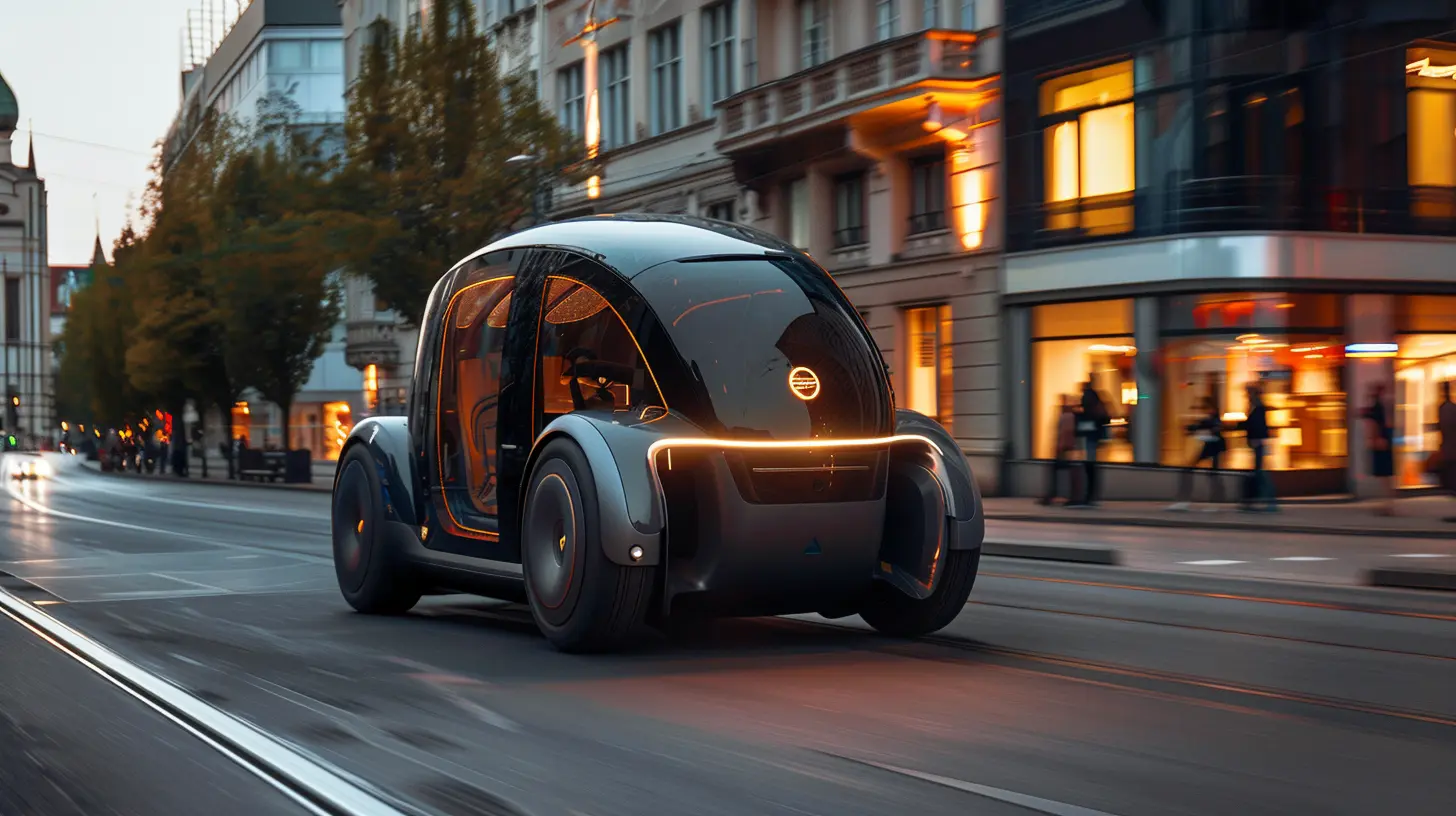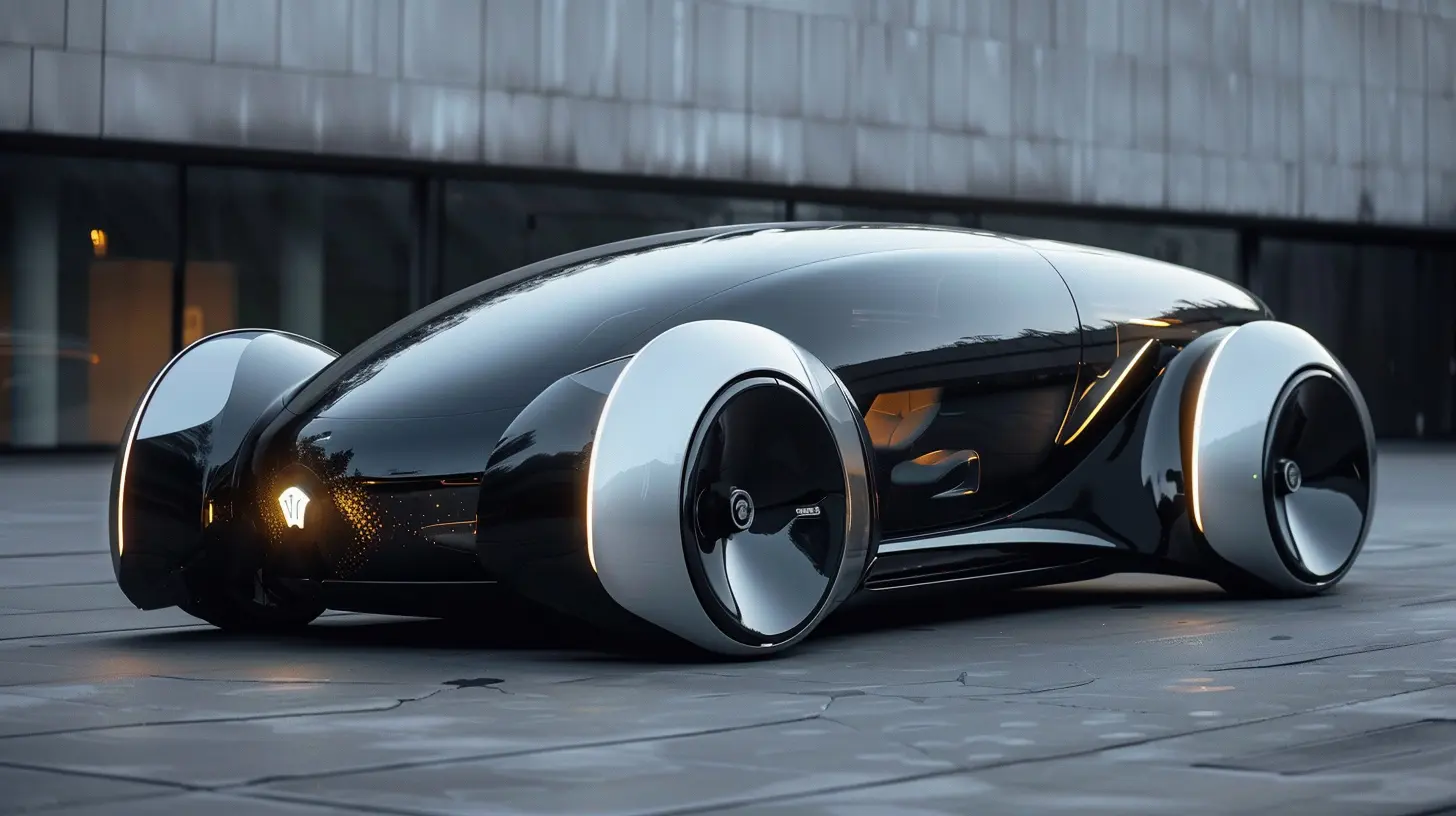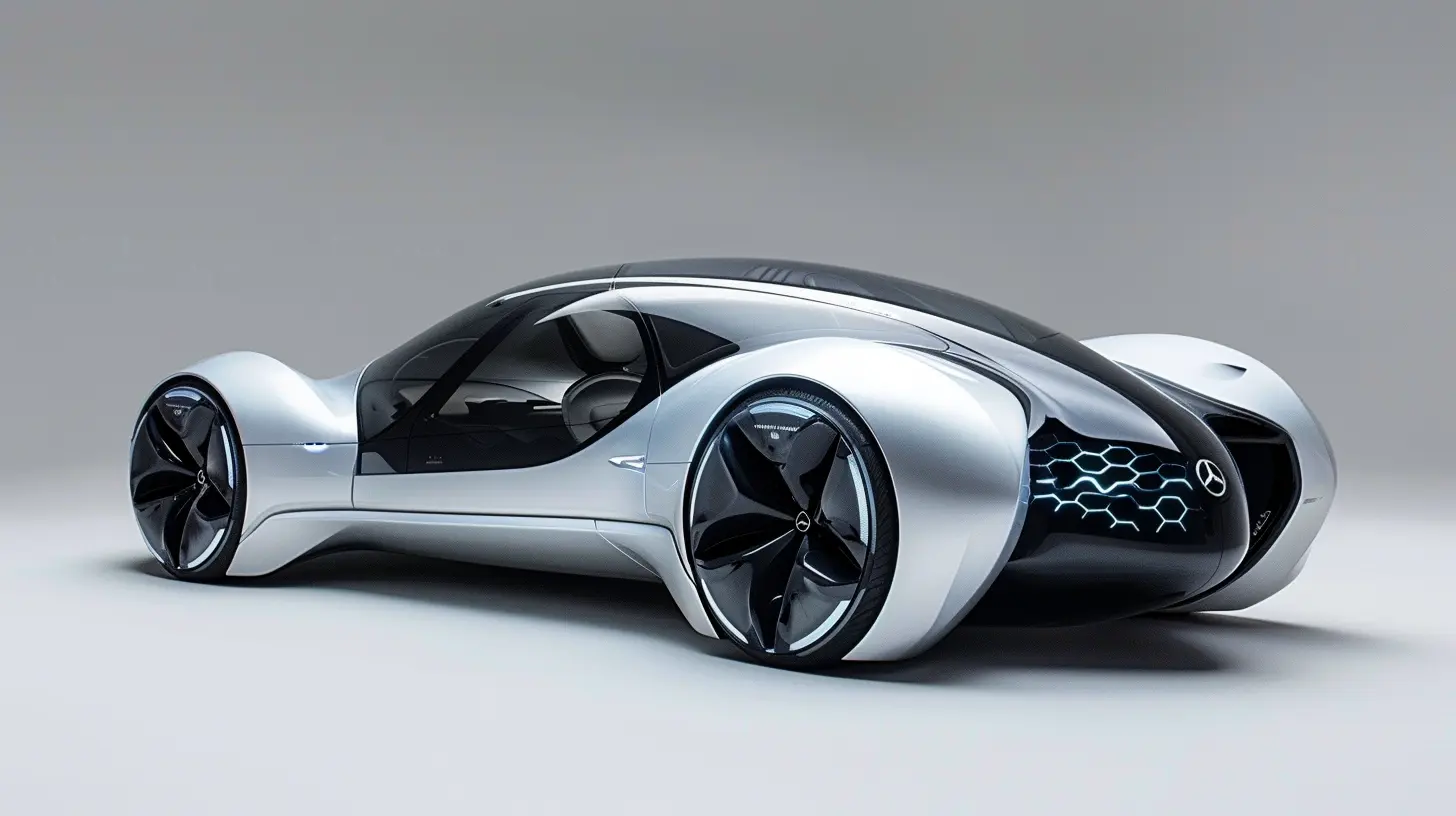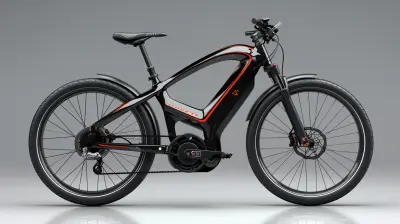How Battery Efficiency Impacts the Future of Autonomous Vehicles
12 January 2025
Autonomous vehicles (AVs) are not just a sci-fi fantasy anymore. They’ve been making headlines for years, and we’re inching closer to a world where self-driving cars are a part of our daily lives. But there’s something we don’t always think about when we imagine cars that drive themselves—battery efficiency. Yup, that humble battery, the one that powers your smartphone, is a huge deal when it comes to autonomous vehicles. It’s not just about how long a car can run without charging; it’s about the entire future of transportation.
In this article, we're going to dive deep into how battery efficiency impacts the future of autonomous vehicles, and why it’s such a game-changer.

Why Battery Efficiency Matters in AVs
Let’s start with the basics: Why is battery efficiency so important in autonomous vehicles?Well, imagine this. You’re in a fully autonomous car, cruising down the highway at 70 mph, and suddenly, the battery dies. Not a great situation, right? The battery is the lifeblood of an AV. It doesn’t just power the vehicle; it also powers the sensors, cameras, LiDAR systems, and the onboard computer that’s making all those split-second decisions to keep you safe.
An inefficient battery could mean the difference between a smooth ride and getting stranded in the middle of nowhere. And let’s face it, nobody wants to trust a vehicle that might run out of juice before it gets to the destination.
Autonomous Vehicles Are Energy-Hungry
Self-driving cars are energy hogs. Unlike traditional vehicles, AVs have to process an immense amount of data in real time. Every second, they analyze information from dozens of sensors, cameras, and radar systems. This requires a ton of computational power, which, in turn, drains the battery.In your regular electric vehicle (EV), the battery is mostly used to keep the car moving. But with AVs, the battery also has to power all these additional systems. It’s like comparing a smartphone that only makes calls to one that runs dozens of apps simultaneously. The latter is going to die a lot quicker if the battery isn’t up to par.

The Role of Battery Technology in the Future of AVs
Now that we’ve established why battery efficiency is important, let’s talk about how we’re improving it. The technology behind batteries has come a long way, but we’re not quite there yet when it comes to what AVs need.Lithium-Ion Batteries: The Current Standard
Right now, lithium-ion batteries are the go-to for most electric vehicles. They’re pretty good at what they do—charging quickly, holding a decent amount of energy, and being relatively lightweight. But when it comes to autonomous vehicles, they have some limitations.For one, lithium-ion batteries degrade over time. The more you charge and discharge them, the less efficient they become. That’s why your smartphone battery doesn’t last as long after a couple of years. The same thing happens with car batteries. Imagine having to replace an AV’s battery every few years—not exactly ideal.
Another issue? Lithium-ion batteries just don’t have the energy density needed to power an AV for long distances while also keeping all those sensors and computers running. We need something better.
Solid-State Batteries: The Future?
Enter solid-state batteries. These are being hailed as the next big thing in battery technology. Unlike lithium-ion batteries, which use liquid electrolytes, solid-state batteries use a solid electrolyte. This makes them more stable, less likely to overheat, and significantly more energy-dense.What does that mean for AVs?
1. Longer Range: Solid-state batteries can store more energy in a smaller space, meaning AVs could potentially drive for hundreds of miles without needing to be recharged. This is critical for making AVs practical for long-distance travel.
2. Faster Charging: One of the biggest drawbacks of current EVs is the charging time. It can take hours to fully charge a lithium-ion battery. Solid-state batteries could cut that time down to mere minutes.
3. Increased Safety: Because they don’t use flammable liquid electrolytes, solid-state batteries are less likely to catch fire or explode. That’s a big win when you’re talking about a vehicle that’s supposed to be safer than a human driver.
While solid-state batteries are still in the development phase, they represent a major leap forward in making AVs more efficient and practical.

How Battery Efficiency Affects Range and Performance
Range anxiety is a real thing for anyone who drives an electric car, and it’s going to be even more of an issue for autonomous vehicles. The more energy-efficient the battery, the farther the car can go without needing a recharge.But it’s not just about range. Battery efficiency also affects the overall performance of the vehicle. A more efficient battery can provide the necessary power to all the different systems in an AV without causing a significant drain. This means better acceleration, smoother handling, and fewer interruptions for charging.
Heat Management: A Crucial Factor
One of the challenges with improving battery efficiency is heat management. Batteries generate a lot of heat, especially when they’re being used to power something as complex as an AV. If the battery gets too hot, it can degrade faster and lose efficiency.That’s why heat management systems are so important. Modern EVs use thermal management systems that regulate the temperature of the battery to prevent it from overheating. But as AVs become more advanced, these systems will need to become even more efficient to handle the increased energy demands.

Sustainability and the Environmental Impact of Battery Efficiency
Let’s not forget the environmental aspect. One of the main reasons we’re so excited about autonomous vehicles is that they’re supposed to be better for the planet. By reducing human error, optimizing traffic, and cutting down on emissions, AVs could help solve some of our biggest environmental challenges.But if the batteries that power these vehicles aren’t efficient, they could have the opposite effect. Mining for the materials used in lithium-ion and solid-state batteries—like lithium, cobalt, and nickel—isn’t exactly eco-friendly. And once the batteries are spent, they need to be recycled, which is easier said than done.
Improving battery efficiency means we can use fewer resources to build them, and they’ll last longer, reducing the need for frequent replacements. This could significantly reduce the environmental impact of autonomous vehicles.
The Cost of Inefficient Batteries
Let’s talk money for a second. Batteries are one of the most expensive components of an electric vehicle, and that’s especially true for autonomous vehicles. If batteries aren’t efficient, it could drive up the cost of AVs, making them less accessible to the average consumer.And it’s not just about the upfront cost. If your AV’s battery degrades quickly, you’ll end up spending a fortune on replacements. That makes the car less cost-effective in the long run, which could slow down the adoption of autonomous vehicles.
Charging Infrastructure: The Bigger Picture
Battery efficiency also ties into the charging infrastructure. If AVs need to be charged frequently, we’re going to need a lot more charging stations. And not just any charging stations—fast chargers that can juice up a car in minutes, not hours.But fast chargers require a lot of power, which puts a strain on the grid. If we can improve battery efficiency, AVs won’t need to be charged as often or for as long, reducing the pressure on our electrical infrastructure.
Battery Efficiency and the Future of Autonomous Trucks and Drones
It’s not just self-driving cars that benefit from more efficient batteries. Autonomous trucks and drones are also part of the equation. In fact, autonomous trucks might be even more dependent on battery efficiency than cars. These vehicles will be traveling long distances, often across entire states or countries, and they’ll need to carry heavy loads.If their batteries aren’t up to the task, it could seriously hinder the development of autonomous freight transport. Similarly, drones—especially those used for deliveries—will need highly efficient batteries to be able to fly for extended periods without needing to recharge.
Conclusion: The Road Ahead
Battery efficiency is going to play a pivotal role in shaping the future of autonomous vehicles. As AV technology continues to evolve, we’ll need batteries that are not only more powerful but also more efficient, safer, and environmentally friendly. Whether it’s solid-state batteries or some other new technology, improving battery efficiency is essential for making autonomous vehicles a reality.The good news is that progress is being made. Researchers and companies are investing heavily in the development of better battery technologies, and we’re likely to see some major breakthroughs in the coming years. So, the next time you think about self-driving cars, remember—it’s not just the software that matters. The battery under the hood is just as important.
all images in this post were generated using AI tools
Category:
Battery TechnologyAuthor:

Vincent Hubbard
Discussion
rate this article
19 comments
Zarenith Bailey
Battery dreams drive self-flying cars!
March 24, 2025 at 5:21 AM

Vincent Hubbard
Absolutely! Battery efficiency is key to realizing the dream of self-flying cars, enabling longer flights and safer operations.
Micah Sullivan
Great insights! Battery efficiency is crucial for the advancement of autonomous vehicles. Excited for what’s ahead!
January 30, 2025 at 3:51 AM

Vincent Hubbard
Thank you! I share your excitement – battery efficiency will undoubtedly shape the future of autonomous vehicles.
Theo McCarthy
This article effectively highlights the crucial link between battery efficiency and the advancement of autonomous vehicles. However, it could delve deeper into the role of sustainable materials and charging infrastructure, as both will be essential in shaping the industry's future trajectory.
January 25, 2025 at 11:32 AM

Vincent Hubbard
Thank you for your insightful feedback! I agree that a deeper exploration of sustainable materials and charging infrastructure would enrich the discussion on battery efficiency in autonomous vehicles. I'll consider incorporating those aspects in future revisions.
Olivia Lewis
Great insights on battery efficiency's crucial role in shaping the future of autonomous vehicles! It's exciting to see how these advancements will revolutionize transportation and create a more sustainable future. Keep up the good work!
January 21, 2025 at 9:33 PM

Vincent Hubbard
Thank you! I appreciate your feedback and enthusiasm for the topic. It’s an exciting time for battery technology and its impact on transportation!
Annabelle Parker
This article beautifully highlights the crucial role of battery efficiency in shaping a sustainable future for autonomous vehicles. Real progress awaits!
January 20, 2025 at 7:23 PM

Vincent Hubbard
Thank you for your kind words! I’m glad you found the article insightful. Indeed, battery efficiency is key to advancing autonomous vehicle technology sustainably.
Kael McKibben
Great insights! Battery efficiency is crucial for advancing autonomous vehicle technology.
January 20, 2025 at 12:11 PM

Vincent Hubbard
Thank you! I completely agree—enhancing battery efficiency is key to unlocking the full potential of autonomous vehicles.
Knox Flores
Battery efficiency is crucial for autonomous vehicles, directly influencing range, safety, and overall performance.
January 19, 2025 at 7:24 PM

Vincent Hubbard
Absolutely! Battery efficiency is key to maximizing range and ensuring the safety and performance of autonomous vehicles, ultimately shaping their future development and adoption.
Leona Frank
Battery efficiency is crucial for autonomous vehicles, influencing range, safety, and overall market viability.
January 19, 2025 at 2:04 PM

Vincent Hubbard
Absolutely, battery efficiency is key to enhancing range, ensuring safety, and making autonomous vehicles commercially viable. It ultimately shapes the future of the industry.
Weston Martinez
Battery efficiency: the unsung hero of autonomous vehicles! Because let’s be honest, we all want our self-driving cars to take us to Taco Bell, not the nearest charging station!
January 18, 2025 at 8:05 PM

Vincent Hubbard
Absolutely! Battery efficiency is crucial for maximizing the range and convenience of autonomous vehicles, ensuring they can prioritize our cravings over charging stops!
Berenice McCarthy
Great insights on efficiency!
January 18, 2025 at 1:15 PM

Vincent Hubbard
Thank you! I'm glad you found the insights valuable.
Camille Cannon
Empowering progress through smarter energy!
January 16, 2025 at 8:42 PM

Vincent Hubbard
Absolutely! Smarter energy solutions are key to enhancing battery efficiency, which will drive the advancement of autonomous vehicles and shape a sustainable transportation future.
Eloise Velez
The quest for battery efficiency isn't just about power; it's the silent heartbeat of autonomous vehicles. As we inch closer to a future where machines navigate our world, what secrets lie within their energy cells? Could the next breakthrough redefine not just mobility, but reality itself?
January 16, 2025 at 12:00 PM

Vincent Hubbard
Absolutely! Battery efficiency is indeed crucial for the advancement of autonomous vehicles, enabling longer ranges and smarter, more sustainable mobility solutions. The next breakthroughs in energy storage could revolutionize not just transportation but the entire landscape of our daily interactions with technology.
Roxanne Howard
This article effectively highlights the crucial role of battery efficiency in shaping the future of autonomous vehicles. Improving energy storage and management will enhance performance, safety, and sustainability in this rapidly evolving industry.
January 16, 2025 at 5:52 AM

Vincent Hubbard
Thank you for your insightful comment! I agree that battery efficiency is indeed vital for the advancement of autonomous vehicles, impacting performance and sustainability significantly.
Emma Turner
“Battery efficiency: because nobody wants their self-driving car to pull over for a nap halfway to Grandma’s house!”
January 15, 2025 at 9:41 PM

Vincent Hubbard
Absolutely! Battery efficiency is crucial for ensuring that autonomous vehicles can reliably complete long journeys without interruptions, enhancing convenience and trust in self-driving technology.
Gunner Griffin
This article effectively highlights the crucial role of battery efficiency in shaping the future of autonomous vehicles. As we strive for longer ranges and quicker charging times, advancements in battery technology will be key to overcoming current limitations and enhancing overall performance. Great insights!
January 14, 2025 at 12:38 PM

Vincent Hubbard
Thank you for your insights! I completely agree—advancements in battery technology are essential for the future of autonomous vehicles.
Kalani McKenzie
Great article! It's fascinating to see how battery efficiency will shape the future of autonomous vehicles. As technology advances, we can expect more sustainable and reliable solutions that enhance safety and convenience. Exciting times ahead for innovation in transportation! Keep up the great work!
January 14, 2025 at 4:27 AM

Vincent Hubbard
Thank you for your kind words! I'm glad you found the article insightful. Exciting times indeed as we explore the potential of battery efficiency in transforming transportation!
Hayden Hodge
Battery efficiency is crucial for autonomous vehicles, directly influencing range, safety, and performance. Innovations in energy storage will accelerate adoption and enhance overall driving experiences.
January 13, 2025 at 9:29 PM

Vincent Hubbard
Thank you for your insightful comment! You're absolutely right—battery efficiency is vital for optimizing the performance and safety of autonomous vehicles, and advancements in energy storage will significantly drive their adoption and enhance user experience.
Kieran Pratt
Efficiency drives innovation forward.
January 13, 2025 at 1:57 PM

Vincent Hubbard
Absolutely! Increased battery efficiency not only enhances vehicle performance but also fuels innovation, paving the way for advanced autonomous technologies.
Zelda Morris
Autonomous cars: where battery life means less coffee spills!
January 12, 2025 at 7:32 PM

Vincent Hubbard
Absolutely! Improved battery efficiency not only enhances driving range but also promotes a smoother ride, reducing those coffee spills.
MORE POSTS

Exploring the Environmental Benefits of E-Bikes

How to Keep Your Smartphone Running Smoothly Over Time

Cloud-Based AI Platforms: A Game-Changer for Machine Learning

Can Wireless Charging Harm Your Battery?

The Future of Solid-State Batteries: What You Need to Know

The Future of Wearable Tech: Innovations Redefining Personal Devices

How to Protect Your Personal Information from Data Breaches

How AI-Driven Gadgets Are Changing Daily Life

The Science Behind Ultra-Fast Battery Charging Technologies

How to Stream on a Budget: Affordable Streaming Devices and Services

Exploring the Role of Wearables in Mental Health Monitoring

How Smart Contracts Are Changing the Legal Industry